Executive-driven at foreign companies, specialist-managed at Japanese companies Need for action on “resources”, “specialist teams”, and “evaluation/target-setting” highlighted
en world Japan K.K., Japan’s global talent recruitment leader, reports the findings of its survey of [ESG/SDGs Implementation Status] at foreign-affiliated companies and Japanese global companies.
Summary of Survey Results
-
Over 50% of companies engage in SDGs activities. [Gender Equality] attracts the most attention.
-
Executive-driven at foreign companies, specialist-managed at Japanese companies
-
Top management is the biggest driver of ESG/SDGs implementation.
-
40% are already deploying ESG/SDGs specialists, and 20% plan new specialist sections/positions.
-
Implementation affected by “resources” and “evaluation/target-setting methods”
Overview

Robert England, Sales Team Manager, en Executive Search, en world Japan
Over 50% of companies engage in SDG activities. Based on our survey this is what the data tells us, however, I believe, and would expect this number to be higher.
en world, the Executive Search team has been committed to sustainability since 2019 and we have seen a steady rise in the number and the seniority of sustainability jobs.
As highlighted in our report, 40% of companies are already hiring more ‘specialized’ people for dedicated positions, with 20% planning to hire newly created roles. Whilst the rise of the CSO is still not in line with the US or Europe, Heads of Sustainability or Director level roles are appearing more frequently. It is no surprise that Top Management is driving these changes. ESG mandates have increased awareness and accountability. This in turn has created opportunities for newly developed positions, reskilling, and internal transfers.
The positive effect on overall salaries has also been noticed. As for Resources, despite a new wave of qualified candidates emerging, a shortage of skilled, experienced talent in ESG/Sustainability remains, which makes this a highly competitive market. All eyes are now on COP27 and the pending aftermath which sees 2023 shaping up to be another very interesting year.
Data Analysis and Commentary
1. Over 50% of companies engage in SDGs activities. [Gender Equality] attracts the most attention.
Overall, 57% of companies surveyed already have initiatives in place regarding SDGs. [Figure 1]
For these companies, [5. Gender Equality] is the SDG generating the highest interest (64% of companies overall) of the 17 SDGs promoted by the UN. In general, foreign and Japanese companies show no big differences in trends, but gaps in excess of 20 points are apparent for the SDGs [5. Gender Equality] (foreign companies : 76%, Japanese companies : 55%) and [10. Reduced Inequality] (foreign companies : 48%, Japanese companies : 23%). [Figure 2]
[Figure 1] Is your company currently taking initiatives related to SDGs?
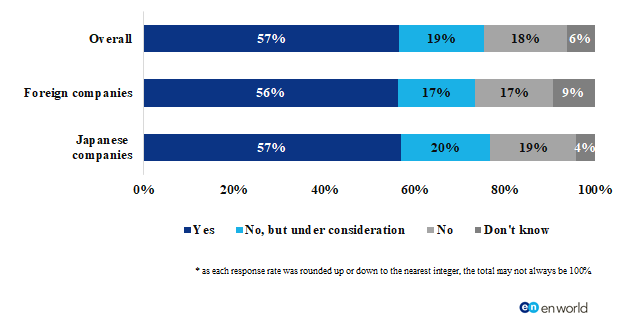
* as each response rate was rounded up or down to the nearest integer, the total may not always be 100%.
[Figure 2] (among companies that already have SDGs activities)
For which of the 17 UN SDGs are you taking initiatives? (multiple answers possible)

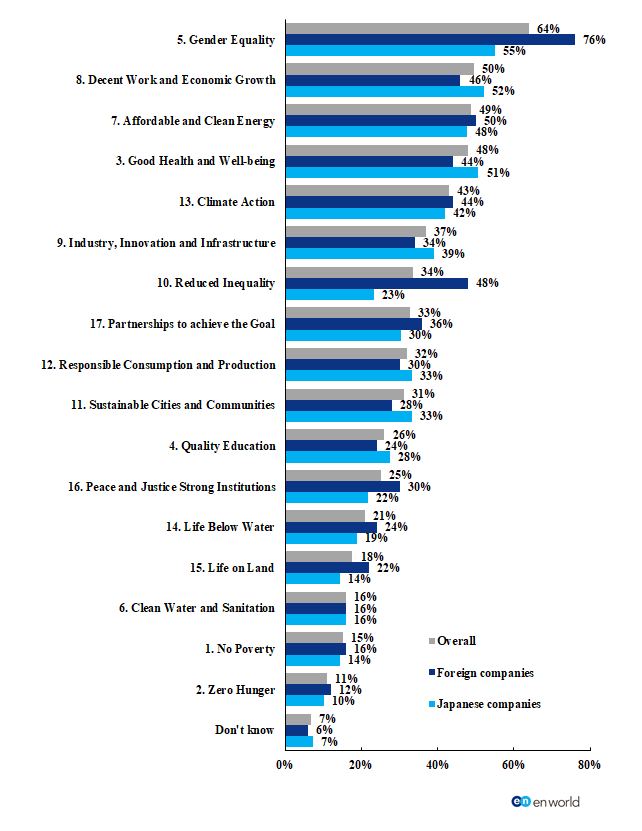
2. ESG/SDGs implementation is viewed more as a business activity than just a CSR issue
68% of all companies with SDGs activities have either a mid- or long-term plan, or both, in place regarding ESG and SDGs. More foreign companies have both mid- and long-term plans, compared to their Japanese counterparts (foreign companies : 33%, Japanese companies : 17%), and an 11-point gap still exists, even after companies with either a mid-term or a long-term plan are added. [Figure 3]
The top reason given for implementing ESG and SDGs is [obligation/contribution to the environment, society, and region], cited by 78% of companies overall. At the same time, [it is directly related to our business] comes second (59%), outranking [it is a part of CSR ] in 4th (49%). This implies that the implementation of ESG and SDGs is not merely seen as a CSR activity but also as an activity that forms an integral part of the business itself. [Figure 4]
[Figure 3] Do you have mid- or long-term plans regarding ESG and SDGs?
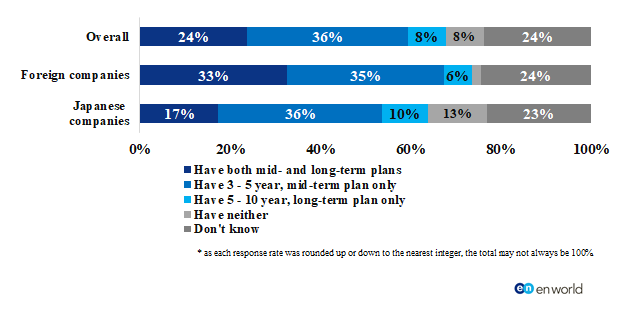
[Figure 4] Why are you implementing ESG and SDGs? (multiple answers possible)
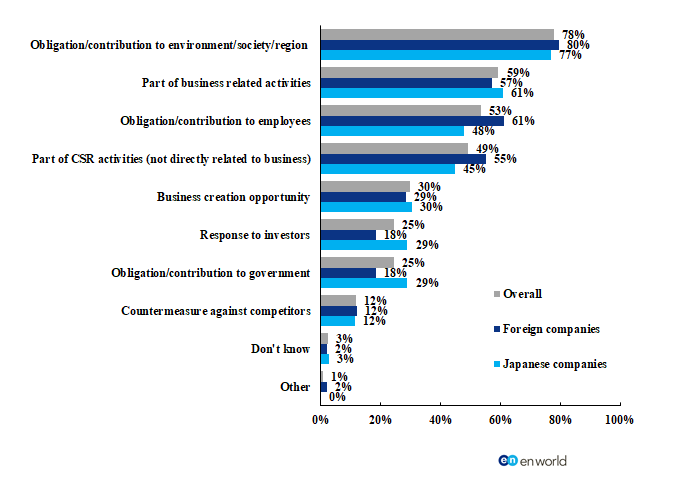
* as each response rate was rounded up or down to the nearest integer, the total may not always be 100%.
3. Top management is the biggest driver of ESG/SDGs implementation
Top management drives the implementation of ESG and SDGs in 47% of all companies that have current initiatives, followed by specialist SDGs/ESG departments (37%) and HR/General Administration (26%).
Multiple differences are evident between Japanese and foreign companies on this point. Particularly significant is the contrasting involvement of Corporate Planning, for which a 22-point gap exists (Japanese companies : 3rd ranked at 30 %; foreign companies : 9th ranked at 8%). [Figure 5]
[Figure 5] Which group manages the implementation of ESG and SDGs? (multiple answers possible)
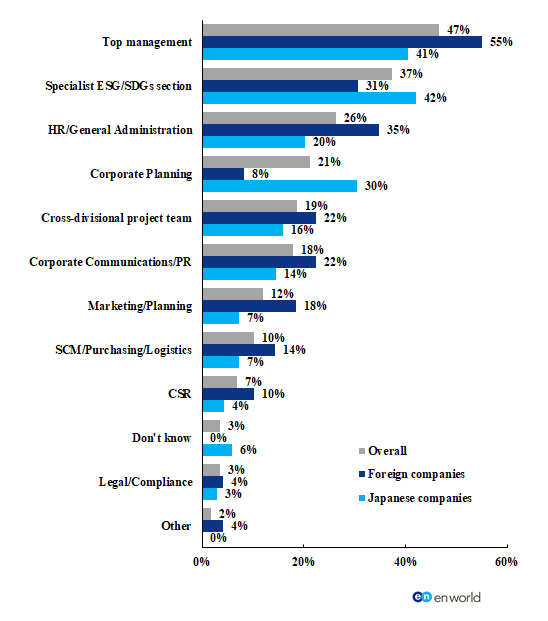
4. 40% are already deploying ESG/SDGs specialists, and 20% plan new specialist sections/positions
Positions for ESG/SDGs specialists already exist in 39% of the surveyed companies, both foreign and Japanese. [Figure 6]
While 21% of all companies are planning to either establish new specialist sections and positions, or to expand their existing set-ups, foreign companies are more likely to do so than their Japanese counterparts (foreign companies : 27%, Japanese companies : 17%). [Figure 7]
[Figure 6] Are you deploying in-house ESG and SDGs specialists?
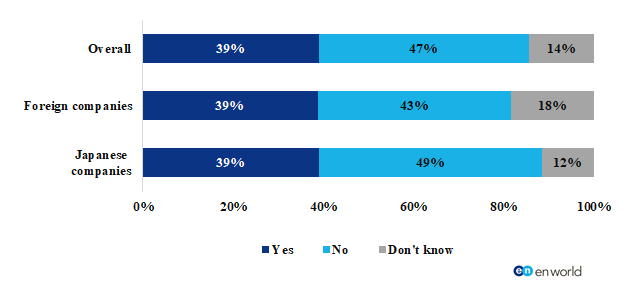
[Figure 7] Are you planning to establish or increase groups/positions for ESG and SDGs experts in the future?
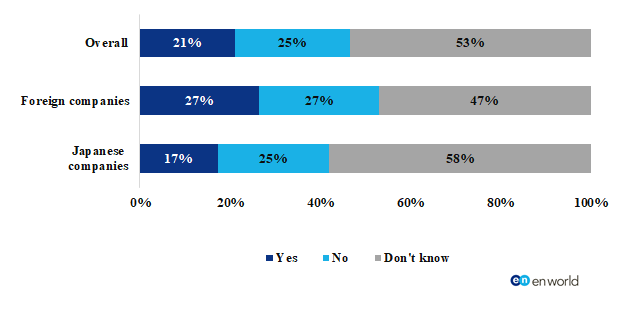
5. Implementation affected by “resources”, “specialist teams”, and “evaluation/target-setting methods”
The most common issues in implementing ESG/SDGs are a lack of resources (knowledge, personnel, budget), cited by 40% overall; a lack of specialist teams/positions to handle ESG/SDGs, etc. (39%); and an insufficient understanding of evaluation and target-setting methods (38%). These results indicate that issues related to resources and evaluation methods are the most prevalent. [Figure 8]
[Figure 8] What issues are you facing regarding the implementation of ESG and SDGs?
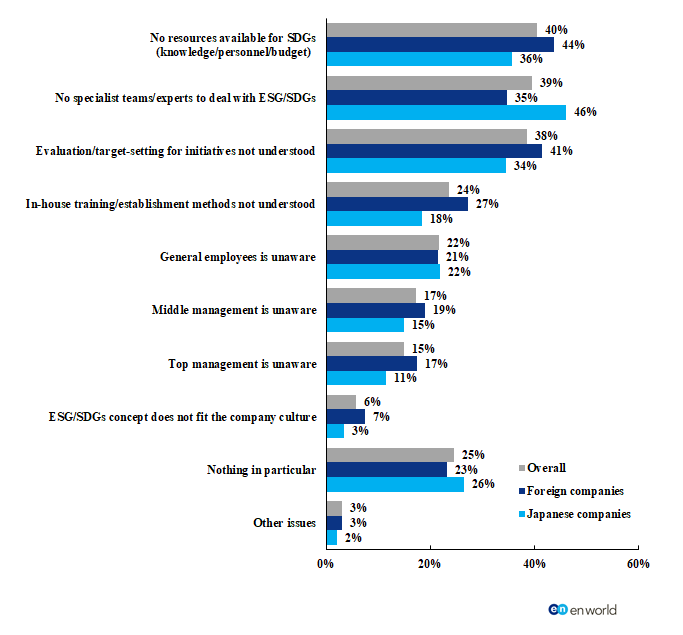
Outline of the survey
Survey method: Internet survey
Surveyed regions: Nationwide in Japan
Survey period: September 7–13, 2022
Number of respondents: 208
Respondents' company affiliation: 42% foreign company employees, 58% Japanese company employees
Response format: Single and multiple responses
▼Download PDF
Survey on ESG/SDGs Implementation at Global Companies _20221110
About en world Japan:
Founded in 1999, en world Japan has grown to become one of Japan’s leading talent acquisition and management firms, with a reach across Asia. We support both foreign-affiliated companies and Japanese companies in connecting with internationally minded candidates, especially for middle and senior management positions. Our exclusive Total Talent Engagement is designed to make talent acquisition more efficient and systematic by utilizing our world-class network and in-house database to find the ideal match for each organization and working professional.
Press Contacts
PR & Communications, en world Japan
E-mail: enworld-pr@enworld.com

